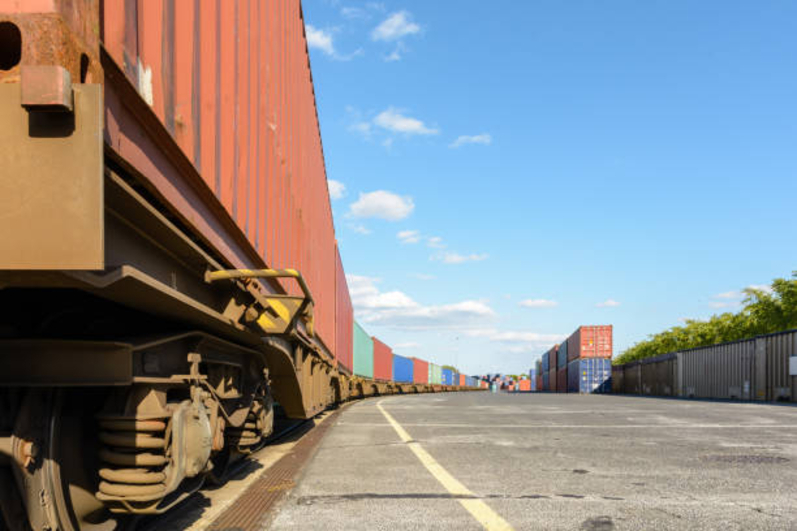
Railfreight Logistics Services provide an essential mode of transportation for goods across land, offering a cost-effective and environmentally friendly alternative to road and air transport. Railfreight is particularly advantageous for long-distance shipping, bulk cargo, and heavy goods. Below is a detailed overview of the key logistics services provided under railfreight, along with their individual components.
Railfreight refers to the transportation of goods via trains over rail networks. It is widely used for moving large volumes of cargo efficiently and is especially effective in regions with extensive rail infrastructure. Railfreight is often used in conjunction with other transportation modes to create a multimodal logistics solution.
Key Advantages:
Cost-Effective: Rail transport typically offers lower costs per ton-mile compared to road and air transport, particularly for bulk shipments.
Environmental Sustainability: Trains are more fuel-efficient and produce fewer emissions than trucks, making railfreight a more sustainable option for logistics.
Capacity and Volume: Trains can carry large quantities of cargo, making them ideal for businesses that need to transport bulk goods over long distances.
The following are the main services provided under railfreight logistics:
A. Freight Transport Services
Railfreight involves various types of freight transport services tailored to different cargo needs.
Key Services:
Intermodal Freight Transport: Combining rail with other modes (such as trucks or ships) to optimize logistics and reduce overall transportation costs.
Dedicated Rail Services: Offering dedicated trains for specific customers or types of cargo, ensuring consistent service and capacity.
Bulk Rail Transport: Specializing in the transport of bulk commodities such as coal, minerals, grains, and chemicals, using specialized wagons for safety and efficiency.
B. Rail Freight Forwarding
Freight forwarding services are crucial for managing the logistics of rail transport, ensuring a smooth shipping process from origin to destination.
Key Services:
Booking and Coordination: Managing the booking of rail freight space with rail operators and coordinating with other modes of transport.
Documentation Management: Preparing necessary shipping documents, including bills of lading, customs declarations, and transit permits, for rail shipments.
Customs Clearance: Acting as a customs broker to facilitate the clearance of goods at borders, ensuring compliance with regulations.
C. Terminal and Handling Services
Rail terminals are essential for the efficient transfer of cargo between different transport modes.
Key Services:
Rail Terminal Operations: Managing the loading and unloading of cargo at rail terminals, ensuring efficiency and safety during the transfer process.
Container Handling: Providing services for handling shipping containers at rail terminals, including stacking, storing, and transferring between modes.
Cross-Docking: Facilitating the direct transfer of goods from one transport vehicle to another without long-term storage, minimizing handling time and delays.
D. Specialized Rail Freight Services
Some industries require specialized rail freight services tailored to their specific needs.
Key Services:
Temperature-Controlled Rail Transport: Offering services for transporting perishable goods, pharmaceuticals, and temperature-sensitive items under controlled conditions.
Hazardous Materials Transport: Complying with regulations for the safe transport of hazardous materials, ensuring that all safety and legal requirements are met.
Automotive Rail Transport: Providing specialized services for transporting vehicles, including finished cars and parts, using car carriers or flatbed trains.
E. Intermodal Logistics Services
Intermodal logistics combine rail transport with other modes to enhance overall efficiency and flexibility.
Key Services:
Containerization: Using standardized containers that can be easily transferred between trucks and trains, optimizing the supply chain.
Multimodal Transportation Planning: Developing comprehensive transportation plans that utilize rail, road, and sea transport to meet shipping needs.
Last-Mile Delivery Coordination: Managing the last-mile delivery of goods from rail terminals to final destinations, ensuring timely delivery.
Technology is integral to optimizing railfreight logistics operations.
Key Services:
Tracking and Visibility Solutions: Implementing tracking systems that provide real-time updates on the status of rail freight shipments, enhancing transparency and accountability.
Data Analytics: Utilizing data analytics to improve route planning, optimize freight loads, and reduce operational costs.
Automated Documentation Processes: Streamlining the documentation process through automation, reducing the risk of errors and expediting customs clearance.
With increasing focus on sustainability, railfreight logistics providers are adopting eco-friendly practices.
Key Services:
Fuel Efficiency Programs: Implementing strategies to improve the fuel efficiency of rail operations, reducing the overall carbon footprint.
Carbon Offset Programs: Offering programs to offset carbon emissions associated with railfreight activities, helping businesses meet their sustainability goals.
Sustainable Packaging Solutions: Encouraging the use of eco-friendly packaging materials that reduce waste and environmental impact during transport.
Railfreight is particularly beneficial for various industries and market applications, including:
Mining and Minerals: Efficient transport of bulk commodities such as coal, iron ore, and other minerals.
Agriculture: Transporting grains, fertilizers, and other agricultural products over long distances.
Automotive: Shipping vehicles and automotive parts between manufacturing plants and distribution centers.
Construction: Delivering heavy materials such as steel, cement, and timber to construction sites.